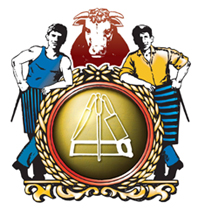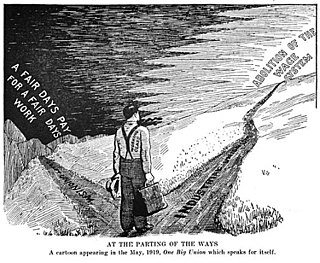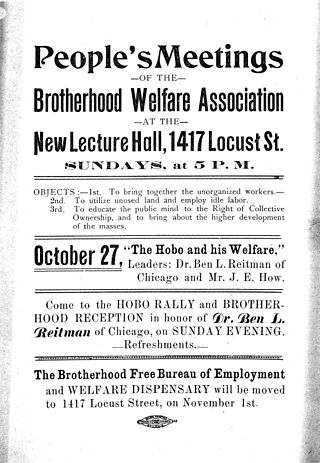
Syndicalism is a revolutionary current within the labour movement that, through industrial unionism, seeks to unionize workers according to industry and advance their demands through strikes, with the eventual goal of gaining control over the means of production and the economy at large through social ownership. Developed in French labor unions during the late 19th century, syndicalist movements were most predominant amongst the socialist movement during the interwar period that preceded the outbreak of World War II.

The Industrial Workers of the World (IWW), whose members are nicknamed "Wobblies", is an international labor union founded in Chicago in 1905. The nickname's origin is uncertain. Its ideology combines general unionism with industrial unionism, as it is a general union, subdivided between the various industries which employ its members. The philosophy and tactics of the IWW are described as "revolutionary industrial unionism", with ties to socialist, syndicalist, and anarchist labor movements.

William Ernst Trautmann was an American trade unionist who was the founding general-secretary of the Industrial Workers of the World (IWW) and one of six people who initially laid plans for the organization in 1904.
Industrial unionism is a trade union organising method through which all workers in the same industry are organized into the same union, regardless of skill or trade, thus giving workers in one industry, or in all industries, more leverage in bargaining and in strike situations. De Leon believed that militarized Industrial unions would be the vehicle of class struggle.

William Dudley Haywood, nicknamed "Big Bill", was an American labor organizer and founding member and leader of the Industrial Workers of the World (IWW) and a member of the executive committee of the Socialist Party of America. During the first two decades of the 20th century, Haywood was involved in several important labor battles, including the Colorado Labor Wars, the Lawrence Textile Strike, and other textile strikes in Massachusetts and New Jersey.

The One Big Union is an idea originating in the late 19th and early 20th centuries amongst trade unionists to unite the interests of workers and offer solutions to all labour problems.
Craft unionism refers to a model of trade unionism in which workers are organised based on the particular craft or trade in which they work. It contrasts with industrial unionism, in which all workers in the same industry are organized into the same union, regardless of differences in skill.

"Solidarity Forever", written by Ralph Chaplin in 1915, is a popular trade union anthem. It is sung to the tune of "John Brown's Body" and "The Battle Hymn of the Republic". Although it was written as a song for the Industrial Workers of the World (IWW), other union movements, such as the AFL–CIO, have adopted the song as their own. The song has been performed by musicians such as Utah Phillips, and Pete Seeger. It was redone by Emcee Lynx and The Nightwatchman. It is still commonly sung at union meetings and rallies in the United States, Australia and Canada, and has also been sung at conferences of the Australian Labor Party and the Canadian New Democratic Party. This may have also inspired the hymn of the consumer cooperative movement, "The Battle Hymn of Cooperation", which is sung to the same tune.

The Australasian Meat Industry Employees Union is an Australian trade union representing workers in the meat industry including in abattoirs, butchers, and smallgoods manufacturers.
Labor aristocracy or labour aristocracy has at least four meanings: (1) as a term with Marxist theoretical underpinnings; (2) as a specific type of trade unionism; (3) as a shorthand description by revolutionary industrial unions for the bureaucracy of craft-based business unionism; and (4) in the 19th and early 20th centuries was also a phrase used to define better-off members of the working class.

The Workers' International Industrial Union (WIIU) was a Revolutionary Industrial Union headquartered in Detroit in 1908 by radical trade unionists closely associated with the Socialist Labor Party of America, headed by Daniel DeLeon. The organization was formed when it broke with the main faction of the Industrial Workers of the World (IWW) over the question of political action.
Free speech fights are struggles over free speech, and especially those struggles which involved the Industrial Workers of the World and their attempts to gain awareness for labor issues by organizing workers and urging them to use their collective voice. During the World War I period in the United States, the IWW members, engaged in free speech fights over labor issues which were closely connected to the developing industrial world as well as the Socialist Party. The Wobblies, along with other radical groups, were often met with opposition from local governments and especially business leaders, in their free speech fights.
Labor federation competition in the United States is a history of the labor movement, considering U.S. labor organizations and federations that have been regional, national, or international in scope, and that have united organizations of disparate groups of workers. Union philosophy and ideology changed from one period to another, conflicting at times. Government actions have controlled, or legislated against particular industrial actions or labor entities, resulting in the diminishing of one labor federation entity or the advance of another.
Solidarity unionism is a model of labor organizing in which the workers themselves formulate strategy and take action against the company directly without mediation from government or paid union representatives. The term originated in a 1978 book Labor Law for the Rank and Filer by Staughton Lynd who described a model of organizing promoted in the early 20th century by the Industrial Workers of the World which eschews the formality and bureaucracy of government-recognized unions, which Lynd and co-author Daniel Gross refer to as "business unions."

The Industrial Workers of the World (IWW) is a union of wage workers which was formed in Chicago in 1905 by militant unionists and their supporters due to anger over the conservatism, philosophy, and craft-based structure of the American Federation of Labor (AFL). Throughout the early part of the 20th century, the philosophy and tactics of the IWW were frequently in direct conflict with those of the AFL concerning the best ways to organize workers, and how to best improve the society in which they toiled. The AFL had one guiding principle—"pure and simple trade unionism", often summarized with the slogan "a fair day's pay for a fair day's work." The IWW embraced two guiding principles, fighting like the AFL for better wages, hours, and conditions, but also promoting an eventual, permanent solution to the problems of strikes, injunctions, bull pens, and union scabbing.

The International Brotherhood Welfare Association (IBWA) was a mutual aid society for hobos founded in 1905–1906. It was the second largest after the Industrial Workers of the World (IWW). It was started by James Eads How who had inherited a fortune but chose to live a hobo life. IBWA was less radical than the IWW, focusing on education and cooperation rather than direct political action. It published the Hobo News, distributed through street sellers. The IBWA was centered in the midwest and had locals in about twenty cities including Baltimore, Buffalo, Philadelphia and San Francisco. The centers, called "Hobo Colleges," offered lodging, hot meals and education. They also became important meeting places for migrant workers during the winter months.
The Agricultural Workers Organization (AWO), later known as the Agricultural Workers Industrial Union, was an organization of farm workers throughout the United States and Canada formed on April 15, 1915, in Kansas City. It was supported by, and a subsidiary organization of, the Industrial Workers of the World (IWW). Although the IWW had advocated the abolition of the wage system as an ultimate goal since its own formation ten years earlier, the AWO's founding convention sought rather to address immediate needs, and championed a ten-hour work day, premium pay for overtime, a minimum wage, good food and bedding for workers. In 1917 the organization changed names to the Agricultural Workers Industrial Union (AWIU) as part of a broader reorganization of IWW industrial unions.
The Syndicalist League of North America was an organization led by William Z. Foster that aimed to "bore from within" the American Federation of Labor to win that trade union center over to the ideals of Revolutionary syndicalism.
The Industrial Workers of the World (IWW) is a union of wage workers which was formed in Chicago in 1905. The IWW experienced a number of divisions and splits during its early history.










